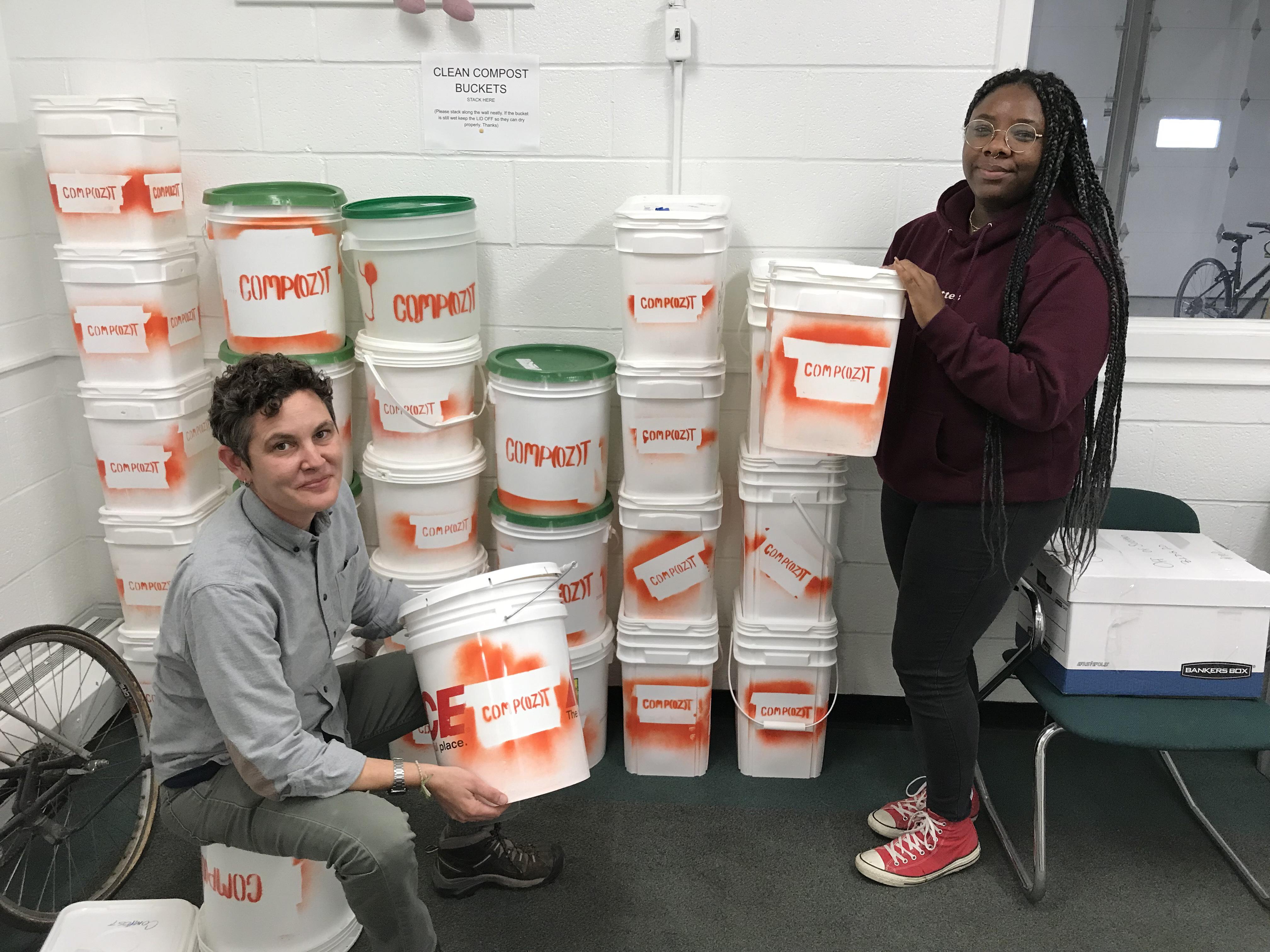Kate Spector, the college's sustainability coordinator (left), and graduate assistant Deiarra Canty show off Comp(Oz)t buckets, which have collected more than 2,100 pounds of compostable waste from dining halls.
SUNY Oswego’s array of sustainability activities have once again earned recognition in Princeton Review’s "Guide to Green Colleges."
Oswego is among 420 colleges in the U.S. and around the world to receive high rankings in administrator and student surveys on such factors as influence of sustainability issues on academic and campus experiences; administrator and student support for environmental awareness and conservation efforts; and the level of environmental issue support on campus.
“What it says is that we have an articulated communal commitment to doing things,” said Kate Spector, the college’s sustainability coordinator. “It feels really good to have a lot of people who are hustling in the same direction.”
The recognition dovetails with the college’s recent STARS (Sustainability Tracking, Assessment and Rating System) Silver recognition and ongoing efforts where a variety of stakeholders -- and especially students, such as the team of sustainability interns -- take a role in initiatives and continuing projects.
Energized students
Spector is happy to have assembled a team of students who explore ways the campus can raise its game in sustainability.
Jon Mills, a graduate assistant in the office while studying art, has co-managed the recent revitalization of the college’s Permaculture Learning Laboratory community garden, assisted with campus sustainability reports and actively helped develop such programs as making maple syrup for the dining halls from trees right on campus and the SeedShare initiative that helps campus community members grow their own plants and save seeds.
“My favorite aspect of working in the Office of Sustainability has to be the opportunities I have had to collaborate with other departments and offices throughout campus,” Mills said. “Every entity on campus utilizes sustainability practices to some degree and being able to address and locate ways the campus as a whole can be a sustainable institution is exciting to me.”
Graduate assistant Deiarra Canty, who also is a resident assistant in The Village, actively works to weave the work of the sustainability team into residence life operations.
“I have been able to connect with hall directors to help answer their questions about sustainability and host programs that engage with students about sustainability,” said Canty, who earned a bachelor’s in psychology from Oswego and is now pursuing a master’s in mental health counseling with a certificate in trauma studies.
Some key contacts include the recycling technicians in every residence hall who “are the front lines of promoting sustainability on campus,” Spector said. “I’m so happy with how excited our recycling techs are.”
“Along with working with the residential halls, my supervisor (Spector) does a great job of providing creative flexibility in the office so everyone has a chance to work on a project that they care about, which is my favorite part of working at the office,” Canty noted.
Canty enjoyed the opportunity to help create or just enjoy such projects as tapping maple trees, the start-of-semester thrift sale and recent Fall Fest.
The inaugural effort to tap maple syrup on campus trees yielded 60 gallons of sap, which turned into more than a gallon of syrup and around 20 gallons of maple tea for Auxiliary Services to provide a sweet dining hall offering. “It’s a really cool way to help students think not only about where their food comes from but also highlights the unique resources we have on our campus grounds,” Spector said.
Several sustainability highlights
Ongoing highlights include:
- The Bike Share program, where students can get a loaner bicycle for sustainable transportation, remains a popular offering, especially with supply-chain issues that have made it sometimes challenging to obtain a bike otherwise.
- In addition to its valuable service as a food pantry, the Students Helping Oz Peers operation in the Penfield Library basement has earned recognition for, among other things, taking in or even swapping professional and winter apparel to help those in need in an environmentally friendly way.
- The renewed Centennial Arboretum, a partnership with Oswego Tree Stewards, Rice Creek Field Station and other community members, added 23 species of trees to a green space behind Moreland Hall.
- The Leave Green project -- where students can donate objects they might otherwise throw out that other students can buy at bargain prices -- keeps several tons out of the local waste stream.
And the sustainability program continues to evolve with new concepts such as a composting project called Comp(Oz)t. So far this initiative that started in mid-October has resulted in more than 2,100 pounds of compostable waste taken from such dining locations as Pathfinder Dining Hall, Lake Effect Cafe, Fusion and Wall Street that Oswego County then processes.
Spector also pointed to how the current Hewitt Hall renovations -- to make it a top national facility for the School of Communication, Media and the Arts -- incorporated sustainability right from the planning phase and will include the second geothermal energy grid on campus, complementing the one that was part of developing the Shineman Center.
For more information on these and other projects, visit the Office of Sustainability website.




